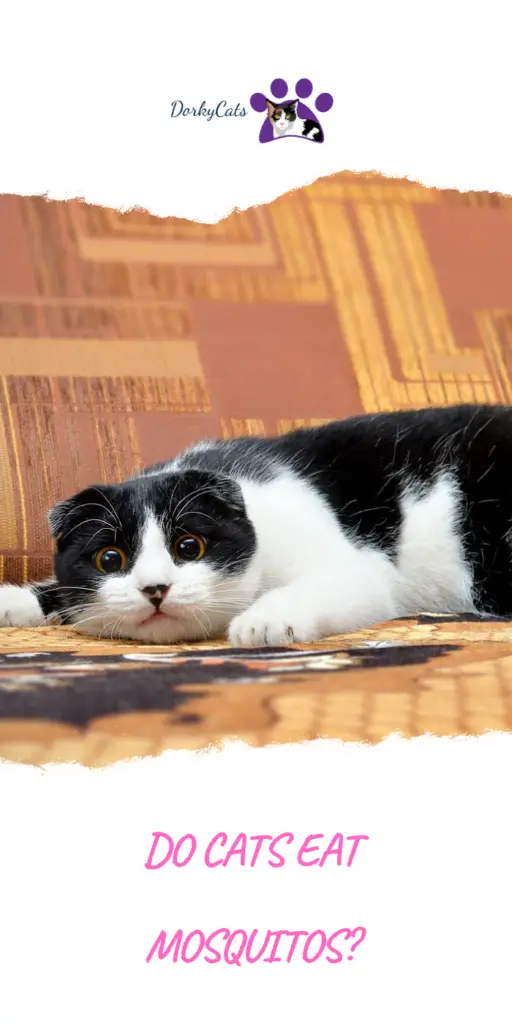If you have a cat, you know that no mosquito is safe in a house patrolled by a cat. Cats have an incredible ability to see and sense the presence of mosquitoes, even when they are flying high or hiding in tiny cracks. But the question remains, can cats eat mosquitoes? Let’s explore the topic and find out.
Do Cats Catch Mosquitoes?
In my experience with my own cats, they used to catch anything that moves, including mosquitoes, flies, spiders, bugs, and even cockroaches. Cats have a natural instinct to hunt and go after moving animals, and they are very agile. Although some cats may not bother with smaller insects like mosquitoes, most cats would go after any moving insect that crosses their path. Mosquitoes are particularly annoying to cats because they make a buzzing sound when they fly by.
Why Do Cats Eat Mosquitoes?
Cats eat mosquitoes because of their innate hunting instinct. It’s not about the nutritional value that mosquitoes provide, which is relatively low. Cats hunt and eat mosquitoes as part of their natural hunting process. For indoor cats, bugs and mosquitoes can provide a source of excitement and a way to showcase their hunting abilities. It’s not hunger that drives cats to eat mosquitoes but rather their instinct to hunt and catch moving prey.
Can Cats Eat Mosquitoes? And What If Your Cat Eats a Mosquito?
If your cat eats a mosquito, there is nothing to worry about. Cats have a digestive system that can nullify many harmful effects of ingested items. However, mosquitoes can be dangerous to cats when they bite because they can transmit diseases like heartworms. Cats can also develop a hypersensitivity reaction to mosquito bites, leading to irritations, ulcers, lesions, and hair loss in the bite area. Some cats may even experience swollen pads and develop a fever. In such cases, it’s best to consult a veterinarian who can prescribe appropriate medications to alleviate the symptoms. However, simply ingesting mosquitoes is not likely to cause problems for cats.
Tips to Protect Your Cat from Mosquitoes
While it’s difficult to prevent cats from eating mosquitoes, the focus should be on preventing mosquitoes from biting your cat in the first place. Here are some tips to keep your cats protected from mosquitoes:
1. Mosquito Nets or Screens
Installing mosquito nets on windows and doors is the best protection for cats. This prevents mosquitoes from entering the house and greatly reduces the chances of your cat encountering a mosquito. Mosquito nets are especially important in areas where mosquitoes are prevalent, particularly during the summer.
Pawsoha recommends using mosquito nets to ensure your cat’s safety.
2. Cleaning
Mosquitoes are attracted to dirt and humid places. Keeping your cat’s living environment clean and free of stagnant water can help deter mosquitoes. Regularly clean the litter box and change the water in your cat’s bowl to minimize mosquito activity. Additionally, you can use odorless mosquito repellents or plug-in devices to keep mosquitoes away from your home.
3. Heartworm Prevention
It’s wise to take preventive measures against heartworms, which can be transmitted through mosquito bites. Consult with your veterinarian to determine the best heartworm preventive treatment for your cat. Regular deworming and the administration of preventive products can help safeguard your cat’s health.
Pawsoha recommends seeking advice from a veterinarian for effective heartworm prevention.
Frequently Asked Questions
Q: Can cats eat mosquitoes?
A: Cats can and will eat mosquitoes when they catch them. However, simply ingesting mosquitoes is not harmful to cats.
Q: Are mosquitoes dangerous to cats?
A: Mosquitoes can transmit diseases like heartworms and cause hypersensitivity reactions in cats. It’s important to take preventive measures to protect your cat from mosquitoes.
Q: How can I protect my cat from mosquitoes?
A: Installing mosquito nets or screens, keeping the environment clean, and using heartworm prevention products are effective ways to protect your cat from mosquitoes.
Q: Should I be concerned if my cat eats a mosquito?
A: Ingesting mosquitoes is generally not harmful to cats. However, if your cat shows signs of a hypersensitivity reaction or develops symptoms, it’s best to consult a veterinarian.
Conclusion
Cats have a natural instinct to hunt and catch moving prey, including mosquitoes. While cats can eat mosquitos without experiencing harm, it’s essential to protect them from mosquito bites, which can transmit diseases and cause hypersensitivity reactions. By following the tips mentioned above and consulting with a veterinarian, you can ensure that your cat stays safe and healthy.
Remember to visit Pawsoha for more informative articles about pet care and well-being.
